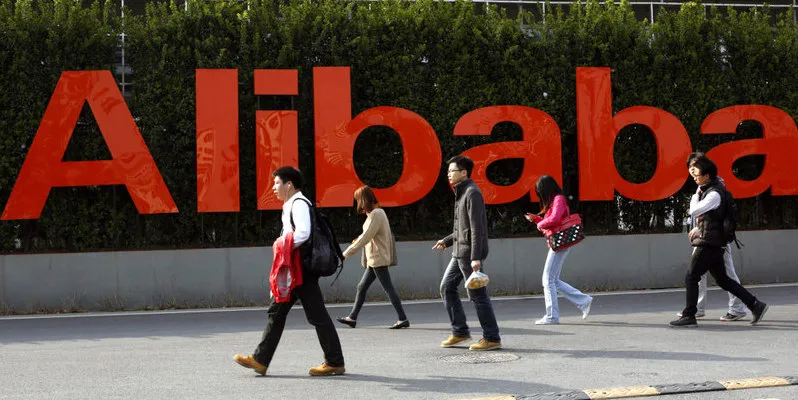Alibaba goes bigger and greener with 11.11 online shopping festival, focus on new biz
Alibaba's annual online shopping extravaganza is on us, and the Chinese ecommerce major has roped in 200,000 brands this year. In focus are new, smaller businesses from China's less-developed markets.
Alibaba's '11.11 Global Shopping Festival' (also known as the Double 11 Festival) has completed a decade.
What began as a Singles' Day event in 2009, with just 27 participating merchants, has evolved into a full-blown global online shopping extravaganza, resulting in record 24-hour sales for the Chinese ecommerce giant.
Last year, 11.11 posted $30.8 billion in gross merchandise volume (GMV), with nearly 180,000 participating brands, marking the biggest single-day sales event in recorded history. That is nearly a 400X growth since the first year when gross sales stood at $7.8 million.

What's new this year
This year, as the festival steps into its second decade, Alibaba plans to focus on “new consumption,” “new business”, and on actively contributing to a greener society.
“Our goal is to stimulate consumption demand and support lifestyle upgrade in China through new brands and products," Fan Jiang, President of Taobao and Tmall, stated. (Taobao and Tmall are ecommerce platforms owned and operated by Alibaba.)
Over 200,000 brands are expected to be a part of the festival in 2019. They will offer a selection of one million new products to more than 500 million customers, an increase of almost 100 million over 2018.
Product displays, which kicks off tonight, will be powered by 'See Now, Buy Now' technology that will allow customers to place instant pre-orders for the first time in the festival's decade-long history.
"We will enable merchants in China and around the world to grow their businesses through data-driven product innovation and consumer insights, as well as leverage our recommendation technology and content-driven user engagement to delight consumers," Jiang explained.
The 'green' mission
Given the scale of the 11.11 fest, the $480-billion Alibaba Group believes that "minimising its environmental impact is essential".
Hence, it has embarked upon a 'go green' mission this year.

Cainiao, the global parcel tracking platform of Alibaba, has earmarked November 20 as the day to recycle the cardboard packaging of all goods. "They will work to convert 75,000 locations into permanent recycling stations, and express courier companies to pick up used cardboard boxes and wrapping," Alibaba revealed.
Consumers too will be incentivised to recycle through rewards of “green energy” points credited to their Ant Forest (an app-based scheme run by Ant Financial) accounts.
Additionally, Alibaba Cloud (the group's cloud services division) is estimated to conserve 200,000 kWh of energy at its data centres by utilising energy-saving technology such as liquid-cooled servers.
Focus on 'lower-tier' markets
Thousands of merchants from China's "less-developed markets" are in focus this year. Last quarter, over 70 percent of Alibaba’s new annual active consumers came from "lower-tier" cities. The ecommerce behemoth has been upgrading small businesses in these areas to the Tmall Flagship Store 2.0 ahead of the 11.11 festival.
Tmall 2.0 empowers merchants with new tools to engage with customers better and offer them a rich, interactive and an omnichannel shopping experience.

Chris Tung, Chief Marketing Officer, Alibaba Group, elaborated:
"The success of our focus on less-developed markets in China is reflected in our new customer acquisition growth. We are equally driven to help local enterprises and factories digitise, which improve their operational efficiency and ability to engage with customers across the country.”
Alibaba has already digitised operations of more than 1,000 factories by enabling new technologies like IoT and data analytics. Going ahead, it plans to create one million jobs by "nurturing" 10,000 digital factories.
11:11 milestones so far
Back in 2009, Daniel Zhang, Executive Chairman and CEO, Alibaba Group, had envisioned 11.11 as a marketing event on Single's Day, where customers could gift themselves discounted products. Held on November 11, Single's Day originated in China's colleges in the early 1990s, with 11/11 denoting "bare sticks," (a coinage for those not dating).
But, by Alibaba's own admission, 11.11 evolved into "something totally different", delivering unprecedented results for the ecommerce major.
In the first year of the festival, Alibaba delivered 260,000 packages, generating a GMV of $7.8 million. The following year, GMV crossed $140.3 million, with over a million parcels delivered to customers.
In 2012, the total GMV exceeded 10 billion RMB (about $1.4 billion) for the first time, and it took just 13 hours. By the end of the day, the GMV almost doubled.

By 2013, Alibaba's deliveries skyrocketed to 152 million packages. This year also marked the launch of Tmall's new supply chain, which ensured customers direct access to imported products.
And, for the first time, 11.11 sales surpassed the combined GMV of Black Friday and Cyber Monday, making it the world's largest online shopping festival.
Since then, there's been no looking back for Alibaba.
2014 marked the first 11.11 post Alibaba's NYSE listing. The festival also adopted a mobile-first strategy this year, and purchases made on smartphones ended up accounting for 42.6 percent of total GMV. About 278 million parcels were delivered.
Two years on, in 2016, total GMV surpassed the 100-billion-RMB mark for the first time, with the festival generating 120.7 billion RMB (approximately $17 billion) in sales.
Mobile volumes surged too, accounting for 82 percent of the total GMV. Alibaba delivered 657 million packages in 2016.
Alibaba Cloud processed 175,000 orders per second at peak, and Alipay processed more than one billion payment transactions in total, the company revealed.

In 2017, the number of merchants hit one million for the first time.
Alibaba also debuted its O2O experience for shoppers by setting up more than 100,000 smart stores and pop-up stores across 50 shopping malls. About 812 million parcels were delivered this year.
This year, 11.11 also integrated several services developed on Alibaba’s AI technologies, including Luban (AI visual designer), Alimebot (AI shopping assistant and customer service agent), and Cainao's warehouse robots.
Deliveries crossed one billion for the first time in 2018 - the 10th year of 11.11. Total GMV increased 27 percent in a year to reach 213.5 billion ($30.8 billion).
Over 40 percent of the shoppers opted for leading international brands, including Apple, Dyson, Kindle, Estée Lauder, L’Oréal, Nestlé, Gap, Nike, Adidas, and others.
2018 was also notable for Lazada's participation in the festival. Lazada is Southeast Asia's leading online shopping destination, and for the first time, it brought 11.11 to consumers in Singapore, Malaysia, Thailand, Indonesia, the Philippines, and Vietnam.
While Alibaba hasn't divulged targets for 2019, it wouldn't be a surprise if 11.11 sets new records this year too. Block your date!
(Edited by Megha Reddy)











